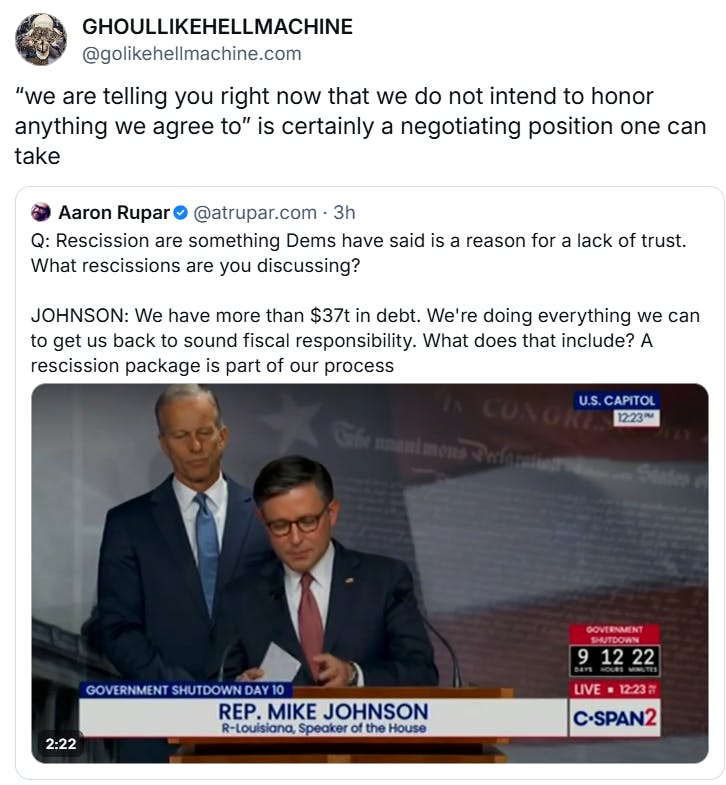There Are Two U.S. Senates—and Only One Knows How to Get What It Wants
While Republicans in the upper house advance agendas and build their base, their Democratic counterparts are mostly bystanders to their own demise.

The United States Senate: Can’t live with it, can’t burn it down (or so my lawyers caution me). Recently, I’ve had cause to ruminate on the upper house’s continued existence and the way its workings threaten our own. And then, this week, liberals were given new reason to rue the “cooling saucer of democracy,” as the Democratic Senate Surrender Subcommittee—apparently with the assent of Chuck Schumer—threw the wettest of blankets on a historically great week for the party by caving on the government shutdown, letting a bloodied Trump up off the canvas, and giving Republicans reason to exult.
Those exultations, according to a report from Zeteo, were just as Trumpian as you could imagine, with anonymous White House officials said to be “cackling” and “gratuitously using terms such as ‘losers’ and ‘pussies’ as they reveled in the relief from a shutdown that even President Trump acknowledged was getting Republicans ‘killed’ politically.” It’s a fitting reminder that there are actually two U.S. Senates in America—one that is committed to dismantling democracy, while the other is committed to a functioning government (sometimes to a fault). It’s also worth remembering that the divergent ways that Republican and Democratic senators discharge their duties is hardly a recent development, but rather baked into the two parties’ DNA.
Recent history paints a stark contrast between how GOP senators behave and how they use the Senate to advance long-term right-wing agenda items, and how Democrats approach the same projects. On February 13, 2016, Supreme Court Justice Antonin Scalia slipped this mortal coil, and Democrats salivated at the prospect of President Barack Obama replacing him. These hopes ended up being short-lived, as the Senate was in the hands of Mitch McConnell. The Kentucky senator, who by then had mastered the art of thwarting the president’s ambitions, simply put the kibosh on advancing Obama’s pick, Merrick Garland, in a norm-breaking display of “preferring not to” that would make Bartleby the Scrivener blush.
Republican senators held the line, to the delight of their base, raising the salience of the Supreme Court vacancy in the presidential election. And once Donald Trump signaled that he was willing to simply follow the Federalist Society’s lead on judicial appointments, it became easy for many Republican elites to look past the fact that he was obviously a dumb asshole who didn’t belong anywhere near the Oval Office. Holding out in the face of public pressure helped McConnell secure lasting power for his party, a reward for keen strategic thinking.
As I was reminded this week, the key to unlocking the Democratic approach to the Senate can be found in 2006, when Connecticut voters nominated Ned Lamont to be the Democratic nominee for Senate, seemingly putting an end to incumbent Senator Joe Lieberman’s career. It didn’t go according to plan: With GOP support, Lieberman ran as an independent and won. But when Lieberman returned to the Senate, rather than knock him down a peg for his dalliances with the GOP, Democratic leaders allowed him to remain a senior member in good standing, with all the attendant chairmanships and rewards.
Lieberman repaid this generosity by repeatedly shivving his fellow Democrats—and we’re all still living with the consequences. As The New Republic’s Monica Potts recently detailed, the public option, which died at Lieberman’s hands, might have gone a long way to keeping today’s insurance premiums more affordable. (When you consider Lieberman’s weakening of Obamacare alongside his 2003 effort to create the Department of Homeland Security, there is so much current Trumpian misrule covered in his fingerprints.)
The differences between Republican and Democratic senators are largely reflective of the two parties’ approaches to politics. On the GOP side, you see an utter ruthlessness when it comes to wielding power, no fear of breaking norms or of the stern reproaches from official D.C.’s media nannies, and a complete dedication to long-term right-wing interests. The slings and arrows of denying Obama his Supreme Court nomination are easy to bear when everyone’s eyes are fully on the prize of taking over the high court for a generation.
Taken as a whole, it must be great to be a Republican voter. Their senators are advancing key ideological projects in concert with the conservative movement, pushing the envelope on what’s deemed to be polite, and training their base to expect Beltway norms to be dismantled in pursuit of their agenda. On the Democratic side, well, they’re not beating the charges that they are an insular party fully in thrall to the Iron Law of Institutions, which holds that “the people who control institutions care first and foremost about their power within the institution rather than the power of the institution itself.”
Democrats seem to treasure their tidy little debating society and its traditions and trappings far beyond any other political concern. They constantly undercut the idea that democracy is in peril by working hand in glove with the party that we are told is seeking to destroy the constitutional order. They rise in defense of the filibuster instead of their constituents and their democracy. And they piss away advantages, like a shutdown that was rattling the Trump presidency, instead of thinking strategically about the next step. (If caving was inevitable, why not force Trump to eat the pain of a ruined Thanksgiving, then step in to “save Christmas”?)
The Democratic senators’ faults shone brightly in the wake of the shutdown cave. It’s painfully obvious that the caucus maneuvered to protect its most vulnerable members from the votes to end the shutdown, instead sacrificing eight members who are not up for reelection in 2026. Schumer voted against reopening the government but is fooling nobody, multiple members are feigning anger at the result they actually sought, and no one is capable of telling the straight story of why they did what they did—probably because they are falling back on their one political idea: Let the GOP hurt people, then step in to collect the electoral winnings once the country is traumatized enough.
It’s all kabuki and prevarication, and no one is above suspicion. The Democrats opted to fund Trump’s government under unanimous consent; not one of them stepped forward to debate the merits further or use their beloved privileges to at least throw some sand in the gears. And as The American Prospect’s Whitney Curry Wimbish noted on Tuesday, it only takes one senator to put Schumer’s continued leadership up for a debate. As Daniel Schuman, executive director of the American Governance Institute, told Wimbish, “Most Senate experts would say it’s highly unlikely. But if the members are really pissed off, this is a mechanism they have.” That’s the big takeaway: While some may huff and puff for the cameras and their angry constituents, this caucus is not, in fact, pissed off enough—or at all.
Looking into the future, Republican voters are going to increasingly cherish the Senate, even as the Democratic base’s ire at the institution grows. As I’ve previously noted, the upper chamber’s malapportionment crisis—in which fewer and fewer voters are needed to construct durable Republican majorities—is only going to get worse. One study suggests that changing demographics could one day allow 30 percent of Americans to elect 70 of its senators—a cohort that will skew rural, white, and conservative.
Imagine a GOP-led Senate capable of convicting a Democratic president in an impeachment trial minutes after their being sworn in—this could be reality in some of your lifetimes. Not so much for the geriatric windbags of the Democratic caucus, but they can look into that bleak future and see a perfect arrangement: an inert superminority caucus, with cushy jobs and top-flight health care, Statler-and-Waldorfing their way into decades-long careers as stern letter writers and handwringing concern-havers. Why put up a fight when you’re getting exactly what you want?
This article first appeared in Power Mad, a weekly TNR newsletter authored by deputy editor Jason Linkins. Sign up here.









